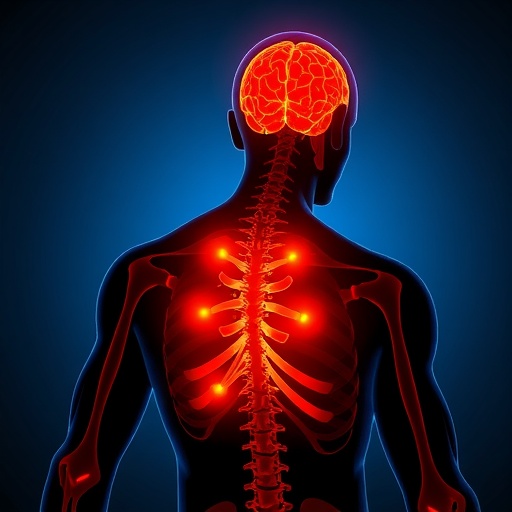In recent years, there has been an increasing awareness regarding the necessity to explore alternative pain management strategies in clinical settings, particularly in the context of surgical procedures. A recent paper published in BMC Complementary Medicine and Therapies meticulously examines patients’ peri-operative experiences concerning non-pharmacologic pain care techniques, centering its discourse on the NOHARM trial. This secondary qualitative analysis, authored by S.A. Minteer, C.M. Audeh, and C. Tofthagen, presents a significant look into how patients experience and perceive various non-drug pain management techniques during a crucial phase of their medical journey.
The shift towards non-pharmacologic pain management approaches is not merely a trend; it is rooted in an urgent need to address the limitations and potential complications associated with conventional pharmacological therapies. Traditional pain management often relies heavily on opioids and non-steroidal anti-inflammatory drugs (NSAIDs), which can lead to adverse side effects, dependency, and insufficient long-term pain control. This pivot towards alternative methods opens up a dialogue about integrating holistic care into surgical practices, paving the way for better patient outcomes and enhanced satisfaction.
In the realm of surgical care, patients frequently report varying degrees of pain, which can significantly influence their recovery journey. As such, understanding their experiences with non-pharmacologic interventions can provide invaluable insights into improving peri-operative care. The focus of the NOHARM trial—highlighting a range of non-drug pain management strategies—serves as a crucial reference point for exploring how patients respond to these techniques during their surgical experiences.
The authors of this study employed a qualitative analysis methodology to gather rich, nuanced data regarding patient experiences. This method allows for a deeper exploration of personal narratives, shedding light on the emotional and psychological intricacies associated with pain management beyond mere physical symptoms. As patients recount their experiences, they delve into the effectiveness of non-pharmacologic techniques, such as mindfulness, relaxation exercises, and other complementary therapies, amplifying the importance of a patient-centered approach in healthcare.
Minteer and her colleagues found that many participants reported a positive impact from utilizing non-pharmacologic interventions. For instance, techniques that involved mindfulness and relaxation often led to reduced anxiety levels, encouraging patients to feel more in control during their surgical experience. This aspect of control is paramount; patients who believe they can actively contribute to their pain management are likely to experience enhanced satisfaction and engagement throughout their recovery process.
Furthermore, the study highlighted the interpersonal dynamics between healthcare providers and patients. Effective communication about the various pain management options available, including non-pharmacologic methods, appeared to cultivate a sense of trust and partnership. Patients who felt empowered to discuss and choose their preferred pain management techniques were more likely to engage positively with their healthcare teams. This collaborative approach not only enriches the patient experience but also reinforces the therapeutic alliance that is vital during the surgical process.
As healthcare continues to evolve, one explanation for the growing popularity of non-pharmacologic techniques can also be traced back to patient education and awareness. In an era characterized by abundant information and an increasingly informed patient demographic, individuals are more equipped than ever to advocate for their health. The insights gleaned from the NOHARM trial evoke a broader conversation surrounding the responsibility of healthcare providers to educate patients about various pain management options.
Moreover, the analysis brought to light that while many patients appreciated the benefits of non-pharmacologic methods, some expressed skepticism regarding their efficacy. This ambivalence suggests a need for ongoing research and education, indicating that not all patients may be readily open to adopting these techniques. Addressing misconceptions and providing robust evidence to support the efficacy of non-pharmacologic pain management can bridge the gap for those who may challenge these methods based on their previous experiences or anecdotal evidence.
Interestingly, the study also captures variations in how different demographic groups respond to non-pharmacologic pain management strategies. Factors including age, cultural background, and previous experiences of pain can influence a patient’s openness and responsiveness to alternative techniques. Such findings underscore the importance of tailoring pain management approaches to meet the diverse needs of patients rather than implementing a “one-size-fits-all” methodology.
In closing, the authors advocate for a systemic change within clinical settings, urging healthcare facilities to incorporate non-pharmacologic pain management techniques into standard surgical protocols. By doing so, providers can ensure that patients are presented with comprehensive pain management options that consider both their physical and emotional needs. The findings from this analysis serve not merely as academic insight but as a clarion call to action for the renaissance of patient-centered care in surgical environments.
In summary, the exploration of non-pharmacologic pain management techniques can substantially reshape the narrative surrounding peri-operative care. Empowering patients with knowledge, fostering open communication, and personalizing care pathways are not only beneficial but essential for enhancing surgical outcomes and overall patient satisfaction. By embracing a more holistic approach, the healthcare community stands to gain significantly in its quest to advance pain management practices and improve the lives of patients during their most vulnerable moments.
Subject of Research: Patients’ peri-operative experiences with non-pharmacologic pain care techniques.
Article Title: Patients’ peri-operative experiences with non-pharmacologic pain care techniques: a secondary qualitative analysis of the NOHARM trial.
Article References:
Minteer, S.A., Audeh, C.M., Tofthagen, C. et al. Patients’ peri-operative experiences with non-pharmacologic pain care techniques: a secondary qualitative analysis of the NOHARM trial. BMC Complement Med Ther 25, 388 (2025). https://doi.org/10.1186/s12906-025-05141-0
Image Credits: AI Generated
DOI: 10.1186/s12906-025-05141-0
Keywords: non-pharmacologic pain care, peri-operative experiences, patient-centered care, NOHARM trial, qualitative analysis.
Tags: addressing opioid dependency in patientsalternative pain management strategiesenhancing patient satisfaction in recoveryholistic approaches in surgeryNOHARM trial insightsnon-drug pain interventionsnon-pharmacologic pain managementopioid alternatives in pain reliefpatient-centered pain management techniquesperi-operative patient experiencesqualitative analysis in pain caresurgical pain management innovations





